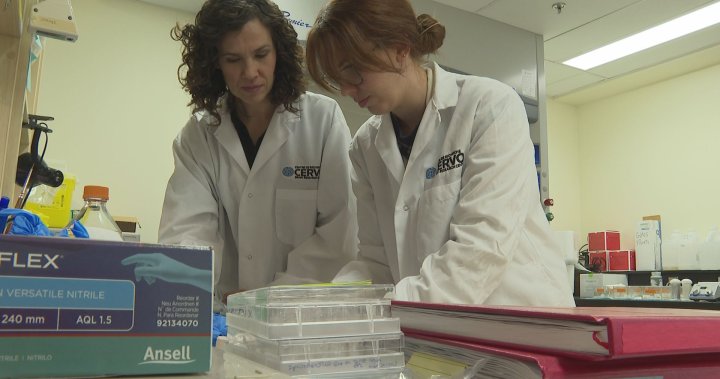Scientists in Quebec City are trying to better understand the early signs of amyotrophic lateral sclerosis (ALS) and are looking at ways of treating it.
A new study out of Université Laval suggests blocking inflammation could reduce symptoms in some patients living with ALS, also known as Lou Gehrig’s disease.
But the research team says there’s still a long way to go when it comes to fully understanding the disease and how best to treat it.
“We know from this disease what happens at the end of the disease,” Université Laval associate professor Chantelle Sephton said in an interview. “What we want to understand is what’s happening earlier than that.”
ALS is caused by the gradual breakdown and loss of motor neurons in the brain and spinal cord, eventually leading to loss of movement as the brain is no longer able to communicate with the body’s muscles.
Working on a genetically modified mouse model, Sephton and her team worked to try to reduce inflammation to see if they could stop or reverse some of the changes to the motor neurons and re-establish connections.
Get the latest Health IQ news.
Sent to your email, every week.
“We treated our mice for eight weeks and we started to see motor improvement, cognitive improvement,” Sephton said. “What we learned from this study is just by lowering inflammation, it allows for the neurons to somewhat recover and re-form these (synaptic) connections, which is really great.”
For Sephton, this latest study is just a small piece of the puzzle in finding new treatments.
“What our study shows is that dampening down inflammation could be an important way to alleviate, to slow down disease progression, but we’re not stopping there,” Sephton said. “We definitely need to keep understanding how to target other things going wrong in this disease.”
Sephton and her team used a semi-synthetic drug based on withaferin A, an extract of the ashwagandha plant.
A similar drug is at the clinical trial stage at Sunnybrook Hospital in Ontario, but nothing like it has been approved for use so far.
“Inflammation is something that’s been worked on quite a bit in ALS, but it’s complicated and we still have a lot to do to understand it,” said David Taylor, vice-president of research for ALS Canada.
“I think what Dr. Sephton has done is really definitely taken us a step forward in terms of that understanding and taking us closer to treatments in the end.”
There are only three drugs approved for the treatment of ALS in Canada, and some patients aren’t eligible for some of them.
Most ALS patients die within two to five years of diagnosis.
“Every new drug that is in research provides hope,” said Phil Lalonde, a soccer coach who was diagnosed with ALS more than two years ago.
Lalonde has taken part in clinical trials himself, in hopes of helping researchers find a “miracle drug.”
Speaking from his home in Beaconsfield, Lalonde says he manages his symptoms with physiotherapy and a combination of two of the approved drugs.
“Each one of these drugs I’m on basically extends your life by about six months,” Lalonde explained. “It may not sound like a lot, but that’s a lot, that’s an extra year — an extra year to see your grandchildren grow up.”
Lalonde says he’s still holding on to hope there will be more effective treatments available someday.
He organizes an annual soccer tournament in Pointe-Claire to raise funds for ALS research in an effort to bring scientists closer to that discovery.
© 2024 Global News, a division of Corus Entertainment Inc.




